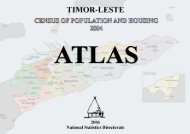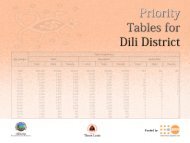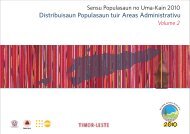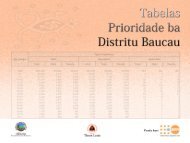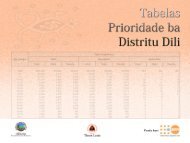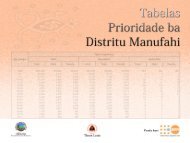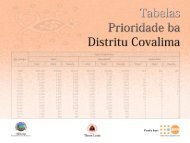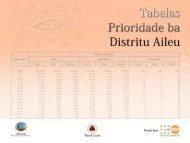Demographic and Health Survey 2009-10 - Timor-Leste Ministry of ...
Demographic and Health Survey 2009-10 - Timor-Leste Ministry of ...
Demographic and Health Survey 2009-10 - Timor-Leste Ministry of ...
You also want an ePaper? Increase the reach of your titles
YUMPU automatically turns print PDFs into web optimized ePapers that Google loves.
15.6 ATTITUDES TOWARD REFUSING SEX WITH HUSBAND<br />
Women’s sexual empowerment has important implications for demographic <strong>and</strong> health<br />
outcomes such as their exposure to HIV <strong>and</strong> other sexually transmitted infections. It is also an<br />
indicator <strong>of</strong> women’s empowerment in general, as it measures women’s level <strong>of</strong> acceptance <strong>of</strong><br />
societal norms that socialize them to believe that women do not have the right to refuse sexual<br />
intercourse with their husb<strong>and</strong> for any reason. The number <strong>of</strong> reasons that a wife finds acceptable for<br />
refusing sexual intercourse with her husb<strong>and</strong> reflects perceptions <strong>of</strong> sexual roles <strong>and</strong> women’s rights<br />
over their bodies, <strong>and</strong> relates positively to women’s sense <strong>of</strong> self-esteem.<br />
To measure beliefs about women’s sexual empowerment, the <strong>2009</strong>-<strong>10</strong> TLDHS included<br />
questions on whether the respondent thinks that a wife is justified in refusing to have sexual<br />
intercourse with her husb<strong>and</strong> under three circumstances: she knows her husb<strong>and</strong> has a sexually<br />
transmitted disease, she knows her husb<strong>and</strong> has sexual intercourse with other women, or she is tired<br />
or not in the mood. These three circumstances were chosen because they are effective in combining<br />
the issues <strong>of</strong> women’s rights <strong>and</strong> consequences for women’s health. Tables 15.7.1 <strong>and</strong> 15.7.2 show<br />
the responses <strong>of</strong> women <strong>and</strong> men, respectively.<br />
Table 15.7.1 shows that about two in three women agree with each <strong>of</strong> the specified<br />
circumstances under which a wife is justified in refusing to have sexual intercourse with her husb<strong>and</strong>,<br />
<strong>and</strong> 51 percent agree with all three <strong>of</strong> the reasons. Women are most likely to agree that a woman can<br />
refuse to have sexual intercourse with her husb<strong>and</strong> if she knows her husb<strong>and</strong> has a sexually<br />
transmitted infection or if she is tired or not in the mood (67 percent each). Sixty-five percent think<br />
that a woman is justified in refusing sexual intercourse if she knows that her husb<strong>and</strong> has intercourse<br />
with other women. Twenty percent <strong>of</strong> women agree with none <strong>of</strong> the specified reasons, meaning that<br />
they think that a woman should not refuse sexual intercourse with her husb<strong>and</strong> under any<br />
circumstances.<br />
Women living in urban areas, those with higher education, <strong>and</strong> those in the highest wealth<br />
quintile are least likely to think all <strong>of</strong> the reasons for refusing sex are acceptable. Interestingly, these<br />
women are also less empowered with regard to other indicators, reinforcing the finding that within a<br />
patriarchal society educated, wealthy, <strong>and</strong> urban women are not automatically accorded equality.<br />
Table 15.7.2 shows the percentage <strong>of</strong> men who think that a wife is justified in refusing to<br />
have sexual intercourse with her husb<strong>and</strong> under the same three specified circumstances: she knows<br />
her husb<strong>and</strong> has a sexually transmitted disease, she knows her husb<strong>and</strong> has sexual intercourse with<br />
other women, or she is tired or not in the mood. The results indicate that the proportion <strong>of</strong> men who<br />
think that a woman is justified in refusing sexual intercourse with her husb<strong>and</strong> for all three specified<br />
reasons is almost the same as the proportion <strong>of</strong> women (53 <strong>and</strong> 51 percent, respectively). Seventy-two<br />
percent <strong>of</strong> men, compared with 67 percent <strong>of</strong> women, think that a wife is justified in refusing sexual<br />
intercourse with her husb<strong>and</strong> if she knows he has a sexually transmitted infection; 71 percent <strong>of</strong> men,<br />
compared with 65 percent <strong>of</strong> women, think that a wife is justified in refusing sexual intercourse if she<br />
knows that her husb<strong>and</strong> has intercourse with other women; <strong>and</strong> 75 percent <strong>of</strong> men, compared with<br />
67 percent <strong>of</strong> women, think that a woman is justified in refusing sexual intercourse with her husb<strong>and</strong><br />
if she is tired or not in the mood. Men age 15-19, those who have primary education, those who are<br />
not employed, those who have never married, <strong>and</strong> those who have no children are least likely to<br />
accept all <strong>of</strong> the reasons for refusing sex.<br />
Notable differences are seen by education, with highly educated men more likely to agree<br />
with all <strong>of</strong> the specified reasons for women to refuse sexual intercourse. Conversely, these men are<br />
also least likely to agree with none <strong>of</strong> the specified reasons, indicating that urban, educated, <strong>and</strong><br />
wealthy men are more accepting <strong>of</strong> women’s entitlement to control their sexuality. There are also<br />
substantial variations by district, with men in Viqueque less likely to accept all reasons for refusing<br />
sex (9 percent), while nearly all men in Manatuto agreed with all the specified reasons for refusing<br />
sex (99 percent). In the case <strong>of</strong> women, it was highest in Ermera (90 percent).<br />
216 | Women’s Empowerment <strong>and</strong> <strong>Demographic</strong> <strong>and</strong> <strong>Health</strong> Outcomes




